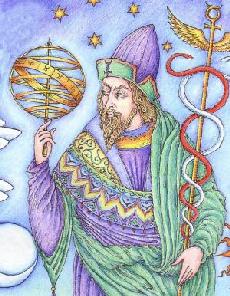

| The Alchemist (Dragon 130) | - | The Alchemist (Dragon 49) | - | The Alchemist (Dragon 45) |
| Dragon | - | The Alchemist (The Dragon 2) | - | Classes |
Better
Living Through Alchemy
Potions and poisons:
The alchemist NPC class
by Tom Armstrong
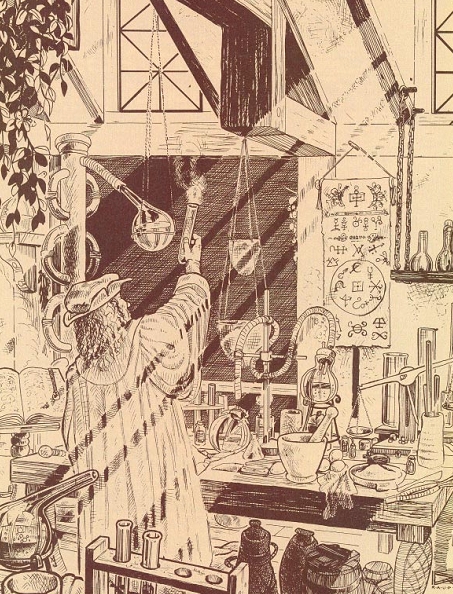
| The alchemist in town | - | - | - | Research and compounding |
| Dragon | Classes | - | The Alchemist | Dragon 130 |
Alchemists were the scientists of Medieval
times. They studied the physical sciences to understand the relationships
between them, and between these sciences
and man. The end of the rainbow
for an alchemist was to find or create
the
Philosopher's Stone, a miraculous item
with the power to transmute ordinary
metals into gold, prolong life, and answer
questions about the mysteries of living
things. Alchemists believed the combination
of science and magic would achieve
these ends.
In AD&D
terms, the alchemist character must
meet or exceed the following scores: intelligence
15, wisdom 13, dexterity 13, and
constitution 15. A high intelligence is
necessary for the prospective alchemist
to
be able to learn and memorize the immense
quantity of facts required for success.
High dexterity is desired so that the
alchemist can easily create his own glassware
and avoid, as much as possible, spills
and other mistakes which may result in
faulty results. Wisdom is needed for the
patience and perseverance required of
all
alchemical work, and an alchemist with
a
low constitution would not long remain
healthy from constant exposure to assorted
poisons, acids, and other solvents
used in his research.
If the alchemist's intelligence
exceeds 16
and his wisdom exceeds 15, he is entitled
to a bonus of + 10% to all earned experience.
The alchemist can be of any alignment,
but is generally neutral in some respect of his alignment.
The alchemist uses 1d4 for hit points.
He
attacks and makes saving throws on the
same tables as does a magic-user, except
that saving throws vs. poisons and acids
a r e a t + 2
. H e c a n b e o f
t h e human, half elven,
or elven (any type) race.
Level advancement is exactly the same
as for
magic-users of the same races, as per
page
9 of Unearthed Arcana. No
other class
may be taken in conjunction with this
class by either humans or demi-humans.
The beginning age in years of an alchemist
is 24 + 1d8 if human, 150 + 10d4 if elven,
or 35 + 1d6 if half-elven.
Before beginning his life of research,
an
alchemist must first complete an apprenticeship
under a master alchemist. During
this apprenticeship, he is taught many
skills, including: glassblowing; plant,
animal, and mineral identification; and, the
basics of metallurgy. He also learns how
to
read, write, and understand the ancient
Alchemist's Script, a secret language
that
is never spoken (being composed of symbols
alone) which is special to this class.
Following this training, any alchemist
can,
at will, utilize the following powers:
locate
plants, locate animals, and summon
animals. These powers can each be utilized
once per round, one time per day for
every five levels of experience the alchemist
has. In order to identify potions while
traveling, the alchemist must have a test
kit, which costs 10 gp and is sufficient
to
make 5-10 tests.
If the nonweapon
proficiencies in the
Dungeoneer's Survival Guide are
used, the
alchemist character starts with no proficiency
slots, because the character utilizes
the skills noted above and further described
in Table 1. The alchemist gains an
additional proficiency slot every four
levels thereafter, beginning with 5th
level.
An alchemist may wear leather or padded
armor but prefers no armor at all. An
alchemist never uses a shield, and is
limited to the following weapons: hand axe,
club, dagger, knife, sickle, sling, staff,
whip, and blowtube.
A sickle is a 2'-long tool used to cut
grass
or grain. Alchemists frequently use one,
since it can be used to gather the plants
they need and can double as a weapon at
the same time. The blade is sharply curved
and is sharpened on the inside of the
curve. Damage for a sickle is 2-5 hp
against small and man-size creatures,
and
l-3 hp against creatures larger than mansize.
The weapon speed factor is 3.
A blowtube is a short tube, 1-2' in
length, used to blow powder at opponents.
The maximum range of a blowtube is 20',
which may be lengthened if the wind is
in
the firer's favor. The powder is contained
in a tissue paper or thin glass tube which
breaks open on impact; the powder may
also be placed in the tube loosely, with
a
paper wad at either end. Powders in glass
or paper "bullets" affect only the target;
loose powders affect all all within a
20'long
cone that is 1' wide at the start and
15'
wide at the terminus. Dusts may also be
emptied out by hand from small packets,
each covering a 10' radius.
An alchemist can use flaming oil as a
weapon. Those aligned with good never
use poisons, but the use of poisons by
other alignments is at the discretion
of the
DM. All alchemists, regardless of alignment,
can create poisons and antidotes.
At the first level, an alchemist is proficient
with but one weapon. The attempted
use of a weapon with which he is not
proficient incurs a penalty on his "to
hit"
roll of -5. Additional weapon proficiencies
are gained every five levels after the
first. An alchemist attacks only once
per
round.
Apothecary
Alchemists can utilize any magical item
which is usable by all classes, plus those
items usable by both magic-users
and
illusionists. Certain magical items have
improved performance when possessed
and utilized by an alchemist:
Alchemy
jug: The amounts of the various fluids are doubled, but the rate of
flow is the same, so the time necessary
to
completely pour out one of the fluids
is
doubled.
Beaker
of plentiful potions: If used by an
alchemist, such a beaker always gives
forth five different potions.
Cloak
of poisonousness: An alchemist
has a 15% chance per level of recognizing
such a cloak, and thereafter has an equal
chance of negating the poison in the cloak,
rendering the cloak perfectly normal.
If
the attempt to negate the poison fails,
the
alchemist must save (at + 2) against the
poison's effects.
Table 1
Alchemist Nonweapon Proficiencies
| Proficiency | Ability | Modifier |
| Animal identification | Intelligence | +3 |
| Glassblowing | Dexterity | +1 |
| Metallurgy | Intelligence | 0 |
| Mineral identification | Intelligence | +1 |
| Plant identification | Intelligence | +5 |
Table 2
Alchemist Experience Points and Levels
| Experience points | Experience level | 1d4 for hit points | Level title |
| 0 -- 3,000 | 1 | 1 | Novice |
| 3,001 -- 6,000 | 2 | 2 | Apprentice |
| 6,001 -- 12,000 | 3 | 3 | Initiate |
| 12,001 -- 24,000 | 4 | 4 | Mixer |
| 24,001 -- 48,000 | 5 | 5 | Brewer |
| 48,001 -- 96,000 | 6 | 6 | Distiller |
| 96,001 -- 180,000 | 7 | 7 | Compounder |
| 180,001 -- 350,000 | 8 | 8 | Junior Journeyman |
| 350,001 -- 700,000 | 9 | 9 | Senior Journeyman |
| 700,001 -- 1,050,000 | 10 | 10 | Junior Alchemist |
| 1,050,001 -- 1,400,000 | 11 | 10+1 | Senior Alchemist |
| 1,400,001 -- 1,750,000 | 12 | 10+2 | Master Alchemist |
400,000 experience points per level for
each additional level beyond the 12th.
Alchemists gain 1 hp per level after the
10th.
Table 3
Alchemist Skill Levels
| Level | Read Language* | Identify Potion** | Identify Poison** | Detect Poison |
| 1 | 50% | 5% | - | - |
| 2 | 53% | 10% | 5% | - |
| 3 | 57% | 15% | 10% | 5% |
| 4 | 60% | 20% | 15% | 10% |
| 5 | 63% | 25% | 20% | 15% |
| 6 | 67% | 30% | 25% | 20% |
| 7 | 70% | 35% | 30% | 25% |
| 8 | 73% | 40% | 35% | 30% |
| 9 | 77% | 45% | 40% | 35% |
| 10 | 80% | 50% | 45% | 40% |
| 11 | 83% | 55% | 50% | 45% |
| 12 | 87% | 60% | 55% | 50% |
| 13 | 90% | 65% | 60% | 55% |
| 14 | 92% | 70% | 65% | 60% |
| 15 | 94% | 75% | 70% | 65% |
| 16 | 96% | 80% | 75% | 70% |
| 17 | 97% | 85% | 80% | 75% |
| 18 | 98% | 90% | 85% | 80% |
| 19 | 99% | 95% | 90% | 85% |
| 20 | 99% | 99% | 95% | 90% |
| 21 | 99% | 99% | 99% | 95% |
| 22+ | 99% | 99% | 99% | 99% |
Philosopher’s
stone: Double the normal
amount of metal can be transmuted. If
green crystals are present, an alchemist
can create 2-5 potions of longevity
from
them. If white powder is present, the
alchemist can utilize it to create two
raise
dead potions rather than just one.
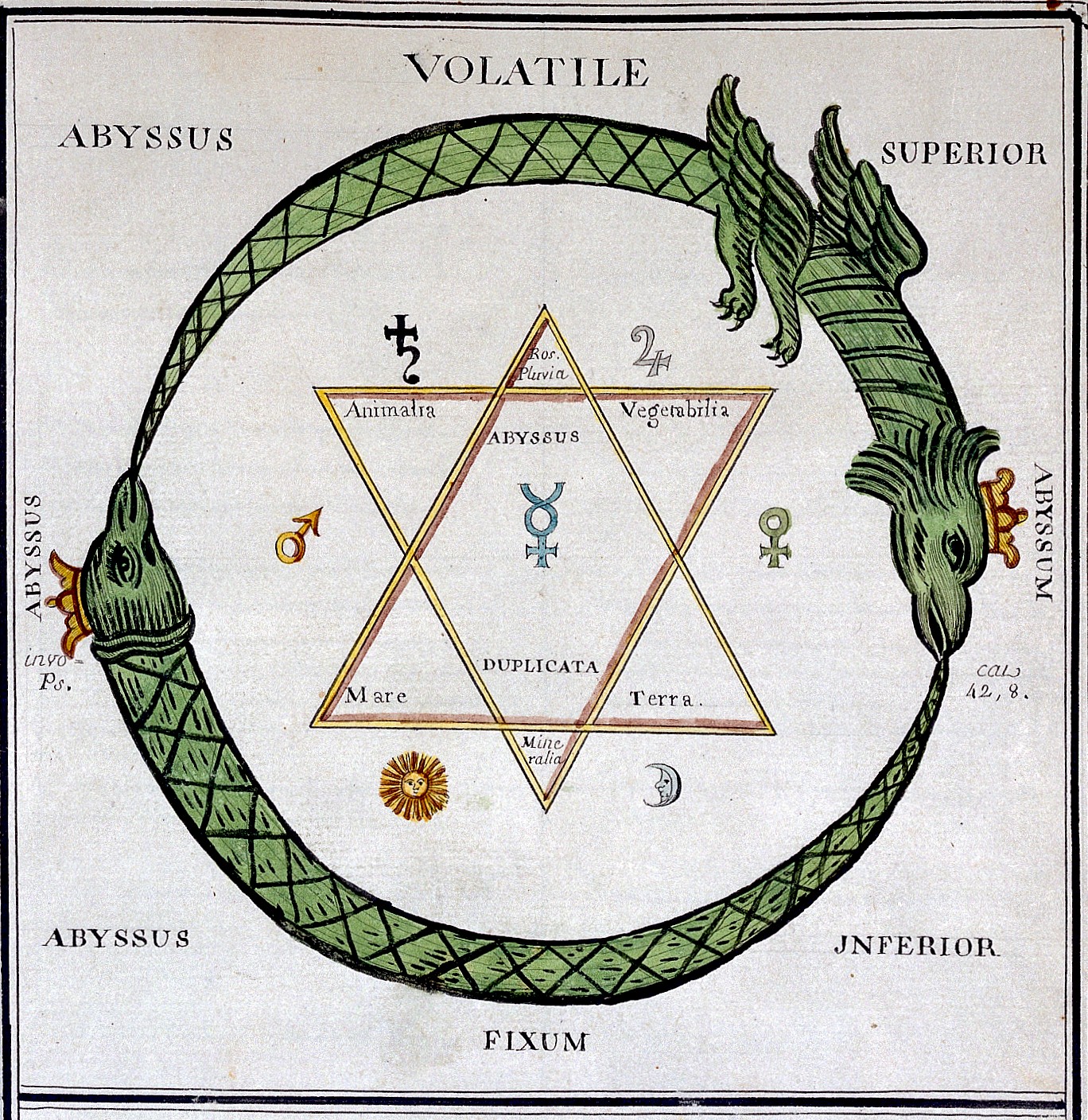
Hirelings and henchmen
can be found at
any time. Henchmen are fighters, rangers,
druids, magic-users, thieves, or barbarians.
A barbarian only becomes the henchman
of an alchemist if the barbarian is 4th
level or higher, and if the alchemist
has
performed some deed or benefit to the
barbarian's clan or tribe. An alchemist
strongly prefers to work for a magic-user,
whether to help create a homonculous,
mix a potion for a magic-user of 7th level
or above, etc. The process of creating
a
homonculous
is given in the Monster Manual,
page 53, and in DRAGON issue #97,
page 35.
When adventuring, an alchemist usually
travels with a group containing fighters,
but more probably with the usual contingent
of clerics, magic-users, and thieves in
addition. The party will probably guard
or
assist the alchemist with the procurement
of the rare materials necessary to compound
his formulas. Should an alchemist
be sought to accompany adventurers, he
only leaves his research and business
if
promised an equal share of any treasure
found, plus ample opportunity to search
for the various herbs, minerals, and other
ingredients necessary for his compounds.
He always has the means to carry a relatively
large number of vials and other
containers in which he can store the various
ingredients he finds in his travels. He
guards any such acquisitions jealously;
their safety is of paramount concern,
secondary only to the safety of the alchemist's
life.
Table 4
Typical Alchemical Equipment
| Item (price) | Description |
| Alembic (2 gp) | An airtight, glass distillation device |
| Apothecary jar (3 sp) | Glass container with fitted glass cover for storage of herbs and other materials |
| Beaker (2 sp) | Open glass container for mixing fluids |
| Bellows (5 gp) | For fanning a furnace or forge |
| Brazier (10-20 gp) | For containment of a fire |
| Cauldron (30 gp) | Large metal container for heating liquids |
| Crucible (5 gp) | Open ceramic or stone container for melting or sublimating materials |
| Cruet (1 gp) | Small glass bottle with a fitted glass top; used for holding fluids |
| Funnel (1 gp) | Glass cone with an opening in the small end; used for pouring liquids |
| Glass, chunks (1 gp/pound) | Raw material for the making of glassware |
| Glass tubing (1 sp/foot) | Material for making of pipettes and other items |
| Glass-working tools (50 gp) | Equipment needed for the making of glassware |
| Graduate (5 gp) | Marked open container for the accurate measurement of liquids |
| Ink (1-5 sp per bottle) | For writing |
| Lens* (10 gp) | Glass magnifier for concentrating rays of light (an examination device) |
| Mortar and pestle (3-18 gp) | Ceramic or stone bowl and grinder, used to powder and mix ingredients; various sizes are available |
| Parchment (1 sp/sheet) | For keeping records |
| Prism* (10 gp) | Triangular, solid-glass item for the refraction or splitting of light |
| Quill (1-5 cp) | For use as a writing pen |
| Reagent bottle (3 gp) | Large glass bottle with a fitted glass top; used for containing acids, poisons, and other caustic fluids |
| Retort (2 gp) | Open glass globe with a long, glass neck; used for distillation |
| Tongs (3 sp) | For handling hot glassware and specimens |
| Vial, clay (1 sp) | Container with cork, glass, or metal stopper; used for the holding of materials |
| Vial, glass (3 sp) | As above |
| Vial, metal (1 gp) | As above |
| Scale (30-100 gp) | Weights and balance for accurate weighing of materials |
| Test kit (10 gp) | Materials for the testing of unknown magical and mundane fluids; contains enough for 5-10 tests |
* Prisms and lenses require a very high
level of skill in glassblowing, and so are not commonly found, except in
the largest cities.
Prices and availability of these items
may vary considerably from campaign to campaign.
Alchemists seldom build strongholds,
preferring to live in cities, where they
are
reasonably close to their sources of supply.
Should an alchemist build a stronghold,
he
will not collect revenues from the local
inhabitants, nor will he often be seen
socially by the locals. Rather, he is
a recluse,
spending his time in research and in
the gathering of materials for his research.
An alchemist can identify potions and
poisons, and can detect poisons at a certain
percentage chance of success, depend
ing on his level. As shown on Table 3,
the
chance for identification of a poison
is
higher than his chance to detect a poison,
In the first case, he already knows he
is
dealing with a poison, and he has only
to
determine what type it is. In the second
case, he does not know that the substance
in question is a poison, and therefore
must
start from scratch. There is never a 100%
chance for success in any of these areas,
since there is considerable variation
in the
compounding of any potion, and one can
never be absolutely sure of any test results
for that reason.
Table 5
Alchemist Substance-Creation Failures
| Alchemist's
intelligence |
Chance of
failure |
| 15 | 15% |
| 16 | 10% |
| 17 | 5% |
| 18 | 3% |
| 19 | 2% |
| 20+ | 1% |
Roll 1d100 when a substance is
completed. If the result is equal to
or less than the percentage shown
after the alchemist's intelligence, roll
a 10% chance for a harmful substance (see
pages 38-39) to be created. If this does not occur, then roll
on Table 5A. A roll on Table 5 of 01
always indicates a failure.
Table 5A
Alchemist Failure Results Chart
| Die roll | Failure result |
| 01-60 | Substance inert; no effect, other than a very bad taste. |
| 61-70 | Makes the imbiber ill for 2-8 hours; -2 to all attacks and saving throws during this time. |
| 71-73 | Intended effect of substance is reversed in a harmful manner, as the DM decides. |
| 74-85 | Minor explosion; 1-4 hp damage to all within 10' of explosion. |
| 86-93 | Explosion; 1-20 hp damage to all within 20' of explosion. |
| 94-99 | Major explosion; 3-30 hp damage to all within 30' of explosion. |
| 00 | A new potion is formed! * |
* If a result of 00 is obtained, the DM
determines the effects of the substance, keeping in mind the relative power
of related substances and of substances of the same level. This does not
mean the new substance must be of the same level as the one
attempted. It is entirely possible that
the new substance is more (or less) powerful
than that intended, and it might not be
beneficial.
The alchemist in town
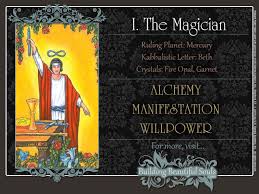
If an alchemist decides to set up a business
in town, he will need a lot of money
to establish a laboratory, library, and
home.
First, a building is necessary, the
cost of which varies according to the
prevailing prices in the campaign. The
building must have sufficient space to
contain at least the living space, library,
laboratory, and sales area.
The living area must include an area for
sleeping and one for cooking, at the least.
The library can simply be a large room
equipped with sufficient shelving to hold
the numerous books, scrolls, and research
records which the alchemist naturally
acquires. The purchase of the basic books
and scrolls necessary to begin a laboratory
costs the alchemist 500-2,000 (5d4 X 100)
gp per level of the potions to be produced.
The laboratory represents a large portion
of the alchemist's investment. Many
various items of glassware, such as alembics,
beakers, flasks, jars, vials, and retorts
are necessary, particularly if the alchemist
plans to work on more than one potion
at
a time. However, he can save some money
by making most of the glassware himself.
The sales area need only be a small
room with a door to the street for customer
access. An additional 50-200 gp is
needed to cover initial supplies of solvents,
herbs, and basic furnishings.
Table 6
Potions and Compounds by Level
| 1st Level | 2nd Level | 3rd Level | 4th Level | 5th Level | 6th Level | 7th Level |
| Animal control | Clairaudience | Clairvoyance | Growth | ESP | Fire breath | Acid resistance |
| Philter of beauty | Rainbow hues | Diminution | Heroism | Extra-healing | Flying | Human control |
| Climbing | Oil of Sharpness, +1 | Gaseous form | Invisibility | Philter of glibness | Elixir of health | Incense of meditation |
| Fire resistance | Speed | Levitation | Polymorph self | Hill giant control | Hill giant strength | Nolzur's marvelous pigments |
| Healing | Sweet water | Life elixir | Oil of sharpness, +2 | Invulnerability | Oil of sharpness, +3 | Stone giant control |
| Philter of love | Ventriloquism | Plant control | Vitality | Water breathing | Oil of slipperiness | White dragon control |
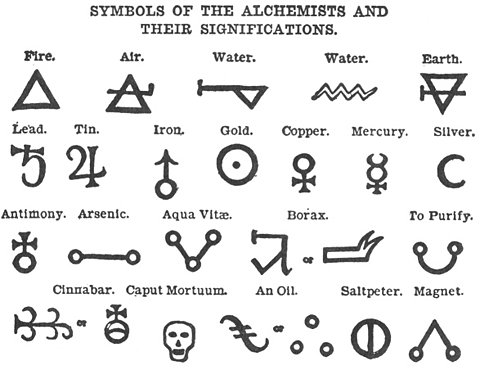
Table 6
Potions and Compounds by Level (Part
2)
| 8th Level | 9th Level | 10th Level | 11th Level | 12th Level | 13th Level | 14th Level |
| Oil of fiery burning | Black dragon control | Copper dragon control | Dust of appearance | Bronze dragon control | Cloud giant control | Dust of dryness |
| Keoghtom's ointment | Brass dragon control | Frost giant control | Blue dragon control | Cloud giant strength | Dust of disappearance | Oil of elemental invulnerability |
| Longevity | Frost giant control | Oil of sharpness, +5 | Cloud giant control | Oil of disenchantment | Gold dragon control | Oil of impact |
| Oil of sharpness, +4 | Green dragon control | Treasure finding | Oil of etherealness | Red dragon control | Magic resistance* | Mist dragon control |
| Stone giant strength | Super-heroism | Undead control | Fire giant control | Oil of sharpness, +6 | Storm giant control | Sovereign glue |
| Oil of timelessness | Dust of timelessness | Elixir of youth | Fire giant strength | Silver dragon control | Storm giant strength | Ultimate solution |
Research and
compounding
The magic potions commonly
available
in the AD&D
game have divided into
"levels," and are shown in Table 6. An
investment of 100-500 gp must be invested
to gather a library of research scrolls
and
books for each level of potions. This
is a
one-time expenditure per level. Each potion
requires a certain amount of time to
compound. The alchemist must have, at
the very minimum, the ingredients shown
in order to create any potion. It is more
likely that the character must do some
research to learn exactly what else may
be
necessary to compound a given potion.
The DM adjudicates the alchemist's success
in research. The cost for research is
at least 50-300 gp per level of the potion
desired ("potion" here means any alchemical
substance). Table 7 describes powders.
These are relatively simple compounds,
the first mixtures learned by an apprentice
alchemist.
While the ingredients
are simple, there
is a chance that the mixture does not
perform as intended. This is the chance
taken when mixing any alchemical formula,
and is indicated on Table 5.
Some of the substances from the treasure
lists are not given here: potion of
delusion, oil of fumbling, elixir of madness,
incense of obsession, dust of sneezing and choking, and the philter
of
stammering & stuttering. These items
are
created only when an unlucky or inept
alchemist errs in the compounding of
some other item; as a result, there are
no
known formulas for them. When an alchemist
fails in the compounding of some
potion, there is a 10% chance, rolled
be
Table 7
Typical Ingredients for Alchemical
Powders
| Powder | Ingredients (and other notes) |
| Aphrodisiac | Asafetida, cayenne, euphorbia (causes target to become more interested in the opposite sex than in anything else) |
| Courage | Tiger lily, persian gum (negates the effects of magical fear) |
| Cure bleeding | Irish moss, kelp, woundwort (stops all bleeding, even if a limb has been severed) |
| Cure circulatory diseases | Peony, sweetbalm, kelp, coriandar (60% chance of curing any normal circulatory disease) |
| Cure nausea | Coriander, alfalfa, peony (cures any airsickness, seasickness, or nausea due to an excess of alcoholic drink) |
| Cure nervous disorders | Lavender, asafetida, coriander, bryony (60% chance of curing any normal nervous disorders) |
| Cure paralysis | Aspargus, bitter herb, alfalfa, bryony (50% chance of curing any paralysis) |
| Cure respiratory diseases | Acacia, angelica, knotweed, coriander (60% of curing any normal respiratory disease) |
| Friendship | Chicory, olive leaf, sweet balm (causes target to become friendly to the powder-caster; saving throws at +1 apply) |
| Healing (minor) | Bryony, daffodil, amaranth (cures 1d4 hp for any mortal, nonmagical creature) |
| Insect repellent | Daisy, jasmine, toadflex (repels all normal or giant insects) |
| Lycanthrope repellent | Wolvesbane, sulfur, Solomon's seal (lycanthropes avoid anything with this powder sprinkled upon it) |
| Magic detection | Jimsonweed, solomon's seal, hawthorn (sprinkling on magical target causes the item to glow with a silvery sparkle) |
| Night vision | Carrot, arrowroot, sesame, jimsonweed (grants the user the ability to see in the dark as well as a cat; this is a light-intensifier and does not grant infravision) |
| Scroll ink | Widely variable, depending on the scroll (for use in scroll writing and copying) |
| Sleep | Poppy, sweet balm, chamomile (target desires only to lie down and sleep; saving throws apply) |
| Smoke | Alder, mangrove (creates dense gray smoke covering an area within 10' radius of impact) |
| Tranquilizer | Hemlock, knotweed, white lotus (target is compelled to tell the truth; saving throws at +1 apply) |
| Truth | Nettle, myrtle, celamine (target is compelled to tell the truth; saving throws at +1 apply) |
| Undead repellent | Mandrake, jasmine, loosestrife (undead avoid anything with this powder sprinkled on it) |
The duration of the effects of all powders,
except for curative types, is 3d6 + 2 minutes. Also, all references to
saving throws in
relation to powders are vs. poison.
fore rolling on Table 5A, that one of these
"mistakes" is the result.
The formulas for potions vary widely.
There are many substances with similar
properties, and these can be combined
in
many different ways to create the same
effect. For this reason, an alchemist
may
know how to create a given potion, but
may not recognize it or a formula for
it
when he sees it, simply because it was
created by another alchemist.
An alchemist can create one level of
potions per day for each level of experience
he has gained.
He may never "combine days" to create
a potion of a level
higher than he has obtained. Powders are
considered to be half-level potions for
this
purpose. For example, a 1st-level alchemist
can create two powders or one first-level
potion. A 6th-level alchemist can create
one sixth-level potion, six first-level
potions, three second-level potions, or any
other combination of potions that does
not
exceed six, in the course of one day.
An alchemist receives experience points
for the creation of potions and other
magical materials equal to the experience-point
value of the finished item. An unsuccessful
attempt at a formula still earns 50 xp.
He
also gains experience through the finding,
identification, or discovery of various
plants, animals, minerals, etc., for his
formulas (5-50 xp per event).
Any alchemist can distill or create poisons.
The strength of the poison depends
on the level of the alchemist. Damage
done
by a poison is equal to the creator's level
multiplied by 1d6, so a 1st-level alchemist
can create a poison that does 1d6 hp damage
unless a saving throw vs. poison is
successful. Naturally, if a saving throw
is
successful, no damage is done by the
poison. There is a 10% chance that the
distillation of a poison results in failure.
If
this happens, the result is simply an
inert
fluid. Do not roll on Table 5 if this
occurs.
Alchemists may distill poisons from
various monsters, if they have a formula
showing them how to do it properly. The
resultant poison does the same damage
or
has the same effect as if it had been
administered by the monster from which it
was distilled. If distilled without this
formula, the result may be weaker or may do
nothing at all.
Whenever an alchemist creates or distills
a poison, he simultaneously formulates its antidote. This is not necessarily
out of concern for others, but more out
of
s e l f - p r e s e r v a t i o n .
Acids can be created by the alchemist,
beginning at the 5th level of ability.
At the
5th level, an alchemist can make an acid
that does 1d6 hp damage to any creature
touched by it. Acids created by alchemists
of higher level than 5th do 1d6 hp damage
more per level of the creator over 5th
(e.g., a 7th-level alchemist can create
an
acid doing 3-18 hp damage).
Powders and dusts are simple compounds
which are quickly learned by an
alchemist. They can be added to foods
or
drinks, sprinkled upon an item or creature
to be affected, or fired from a blowtube.
Most powders are compounded from
various herbs, roots, flowers, etc. The
acquisition of these plants is not necessarily
easily accomplished. The DM determines whether or not a given component
is available to the alchemist, and if
not
available, what must be done to acquire
it.
A few powders require the addition of
powdered gems or other substances. For
this reason, most alchemists become collectors
of gems and jewelry rather than
gold and silver.
Various compounds, powders, and potions
are given in Tables 7 and 8, along
with the substances necessary for their
compounding. However, the alchemist
character needs to research or acquire
these formulas to determine the proper
proportions of the ingredients and the
methods of their compounding. The DM
may include in treasure hoards some
scrolls containing various formulas for
potions and powders. Without a formula
for a potion or powder, an alchemist cannot
create it, even if he knows everything
else about that substance. Magical alchemical
scrolls may be found which enable an
alchemist to compound a potion that is
otherwise beyond his level, but these
are
usable for one mixing only.
Other useful substances which an alchemist
might acquire include acids, alkalies,
alcohol, oils, and water, for use as solvents,
corrosives, preservants, and the
like. A chemistry
textbook offers more
information for gamers who want more
details on this.
Even though the alchemist appears to be
more a scholar than an adventurer, he
can
still be an active and viable NPC, and
a
great asset to any group of adventurers
returning to town from a trip into the
wilderness. If the DM allows the alchemist
to be proficient in throwing rocks, vials,
etc., the alchemist can be effective as
secondary artillery, preceding hand-tohand
combat. Also, his assortment of
fluids and powders can be as effective
as
magical spells in many cases. It becomes
frustrating for the characters to find
a
useful potion, then have to use of half
of it
in order to determine just what it is.
Alchemists can save lots of trouble here with
their special skills.
Try the alchemist in your campaign. He
makes a great NPC for the DM, but he's
even more fun for the players!
[Previous versions of the alchemist NPC
have appeared in DRAGON issues #3, 45,
and 49.]
Table 8
Typical Ingredients for Alchemical
Potions and Powders
| Alchemical substance | Typical ingredients |
| Appearance, dust of | 6 oz. of powdered chalk, 500 gp of emerald dust, and 12 annis hairs |
| Acid resistance, oil of | Two giant slug eyeballs, and a black dragon fang |
| Animal control | A paw, hoof, or claw of the animal type to be controlled, and a lock of a druids hair |
| Beauty, philter of | A lock of sirine hair, and a ground succubus horn |
| Clairaudience | Six giant bat ears |
| Clairvoyance | Two giant owl eyes, and a cadaver thalamus gland |
| Climbing | A giant spider leg |
| Diminution | 1 oz. shrinking violet flowers, with either 1 oz. of snyad blood or a powdered sprite wing |
| Disappearance, dust of | 12 powdered pixie wings, or one whole (dead) invisible stalker |
| Disenchantment, oil of | 12 oz. of disenchanter hair |
| Dragon control | The brain of the appropriate dragon type |
| Dryness, dust of | A dustdigger arm, or a portion of a sandling |
| Elemental invulnerability, oil of | Dependent upon the type of elemental to
be controlled: earth uses tiger eye, water uses smoky
quartz, air uses zircon, and fire uses ruby (gem values of at least 1,000 gp). Powder the gem, then add 4 oz. of the appropriate element. |
| ESP | 6 oz. of doppleganger blood, or two mind flayer tentacles |
| Etherealness, oil of | A bottle of aerial servant essence |
| Extra-healing | 6 oz. of troll blood |
| Fire breath | A chimera stomach, or a barbed devil claw |
| Fiery burning, oil of | Five salamander scales, or three drops of phoenix blood |
| Fire resistance | A red pyrolisk feather, or a stench kow horn |
| Flying | Eight hippogriff wing feathers, or a lock of Pegasus tail |
| Gaseous form | Dust from a destroyed vampire, or three dead vapor rats (in a bottle) |
| Giant control | A brain of the appropriate giant type |
| Giant strength | Six fingernails from the appropriate giant type |
| Glibness, philter of | Any minor devil tongue |
| Growth | A spriggan heart, or 6 oz. of ogre-mage blood |
| Healing | A vial of holy water, three lammasu feathers, or 1 oz. of troll flesh |
| Health, elixir of | A vial of holy water, and a couatl feather |
| Heroism | The heart of a lion, or an androsphinx feather |
| Human control | 6 oz. of nixie blood, or dust from a destroyed vampire or succubus |
| Illusion, dust of | A lock of lamia hair or a rakshasa brain |
| Impact, oil of | A powdered minotaur horn |
| Invisibility | 6 oz. of pixie sweat |
| Invulnerability | A tarrasque or gargoyle horn |
| Kheoghtom's ointment | 1 pint of royal jelly from giant bees |
| Levitation | Two beholder eyestalks, or 8 oz. of Type II demon ichor |
| Life, elixir of | 10 phoenix head feathers |
| Longevity | 3 oz. of elven blood, or 6 oz. of mummy dust |
| Love, philter of | A lock of dryad hair |
| Meditation, incense of | 1 oz. of hallucinogenic spores from a myconid, and one holy/unholy symbol |
| Nolzur's marvelous pigments | Clematis, lady's mantle, and 500 gp worth of platinum or sapphire |
| Plant control | 2 oz. of treant sap, 1 oz. of shrieker spores, or a vegepygmy "brain" |
| Polymorph self | A doppleganger brain, or a jackalwere heart |
| Rainbow hues | Two giant dragonfly wings |
| Sharpness, oil of | One tarrasque tooth per +1 of enchantment |
| Slipperiness, oil of | 4 oz. of boggle oil |
| Sovereign glue | 6' piece of cave fisher filament, one roper tentacle, or 16 filaments from a giant sundew |
| Speed | A thri-kreen eye, four unicorn mane hairs, or a giant wasp sting |
| Super-heroism | Four giant wolverine claws, and 6 oz. of (any) giant's blood |
| Sweet water | Four shedu tail hairs |
| Timelessness, oil of | Part of a time elemental |
| Tracelessness, dust of | 2 oz. of boggart bone |
| Treasure finding | Three ancient dragon scales |
| Undead control | Hand of an evil high priest, or dust from a lich's bones |
| Ultimate solution | 2 oz. of dracolisk acid, and two "pearls" from a land urchin |
| Ventriloquism | A bottle of leprechaun's breath |
| Vitality | A vial of holy water, and a titan fingernail clipping or 3 oz. of troll blood |
| Water breathing | Eight water naga scales, or 1 oz. of triton gills |
| Youth elixir | 6 oz. of ki-rin hair |
These ingredients are only a few possibilities.
Imagination and research may discover other items that also produce the
desired
compound. The DM must keep in mind that
it should not be easy to acquire all the ingredients for a potion -- the
more powerful
potions in particular. At least one ingredient
should be from a powerful monster, be very rare and expensive, or be found
in some
remote place.
Leomund's
Tiny Hut
A recipe for the alchemist
by Lenard Lakofka
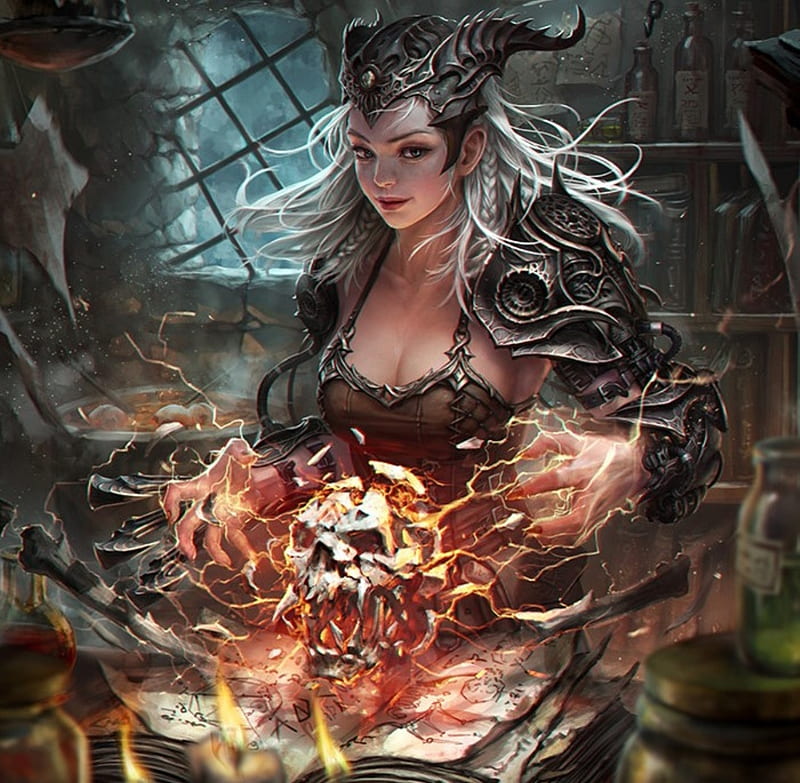
| Explanation of special notes | - | Alchemist spells | - | Spell notes |
| Dragon | Classes | The Alchemist | Best of Dragon, Vol. III | Dragon 49 |
The alchemist is an obscure sub-class of
magic-user. He/she
is always a non-player character, as the
rules here will indicate.
The class is detailed because information
on the alchemist is of
value when he/she is encountered in a
town or hired by a player
character as a henchman. It is helpful
if the DM knows what an
alchemist can and cannot do.
His profession encompasses some of the
common trades,
and thus tradesmen, when encountered,
might have minor
knowledge of alchemy. These trades are
those of potter, glass
blower, brewer and distiller as defined
within the text. Brewers
and distillers need not learn magic, of
the type used by
alchemists, to ply their trades.
An alchemist must have the following minimum
or maximum
scores: strength at least 9, intelligence
at least 10, wisdom at
least 6, dexterity at least 9, constitution
at least 14 and charisma
less than 16. Humans, elves and half-elves
may be alchemists.
Only humans can become masters and grandmasters.
An
alchemist may never be a multi-classed
character.
Experience is gained by alchemists only
from plying their
trade and never from adventuring. Experience
is given as fol
lows, in case you wish to advance a non-player
novice through a
few ranks to be more useful to the party
as a henchman.
For each piece of pottery used in the
trade, 3xp (this award
cannot be given beyond 3rd level).
For each major glass instrument blown/crafted,
6xp (this
award cannot be given beyond 5th level).
For each potion identified by the “10%
test,” 7xp (this award
cannot be given beyond 7th level).
For each potion made correctly, 10% of
the potion’s xp value.
If no xp value is given, then award 20
points. This award is given
for every properly made potion.
For each poison made correctly, 5xp for
a mild poison, 15xp
for a toxic poison, 25xp for a lethal
poison and 40xp for a
destructive poison. This award is not
given to Masters and
Grandmasters.
For each mixture analysis done correctly,
45xp.
For each spell learned, 7xp per level
of the spell.
Alchemists must have specific intelligence
levels to obtain
higher magic spells as well as for the
more complex potions. If
the alchemist is not smart enough, he/she
will never be able to
cast higher-level spells or make the most complex potions.
Alchemists must have an intelligence of
12 for 3rd-level spells
and second-difficulty potions; intelligence
of 14 for 4th-level
spells and third-difficulty potions; intelligence
of 16 for 5thlevel spells and fourth-difficulty potions.
The alchemist writes “prescriptions” in
a special language.
His/her spells, if any, also are written
in “Alchemese.” Thus, a
magic-user cannot use an alchemist’s spell
book without both
Read
Magic and Comprehend Languages. Once an individual
spell is understood the magic-user would
not have to resort to
using those two spells again to read that
particular
spell.
In like manner, an alchemist must have
Read Magic and Write
to transcribe a spell from a magic-user’s
book to his book.
He/she can never learn the spell directly
from the magic-user’s
book and transcribe it later. It must
be translated and then
written down. Copying a spell without
Write is possible but the
chance of error is 10% per level of the
spell and the time required
is one week per spell level. An error
in the spell will ruin it 80% of
the time but the other 20% it will cause
it to backfire. Clerics and
Illusionists cannot understand Alchemese,
but neither can an
alchemist read their scrolls or books.
Alchemists can begin to make potions at
4th level, but the
chance of misconcoction at that level
is quite high. Some
potions, as mentioned earlier, are beyond
the intelligence of
some alchemists and thus are doomed to
failure. Even a 5thlevel alchemist with the proper intelligence may attempt
a
fourth-difficulty potion, but his chance
of success is rather
small.
Alchemists may not wear magic armor of
any type, including
Bracers of Defense, but items that are
of Protection (cloaks and
rings) may be used. Alchemists rarely
use weapons but they
may learn the use of two, the dagger (never
thrown) and the
dart. Those two weapons may be magical.
Alchemists cannot
employ rods or staves and only wands of
Detection and Magic
Missile can be used. Even with Read Magic,
scrolls are useless
to alchemists.
The alchemist may own the following items
from the miscellaneous magic list in the DMG: Alchemy jug (a Master can
obtain two types of liquid per day from
the jug), Bag of Transmuting, Bag of Holding, Beaker of Plentiful Potions,
Brooch of
Shielding, Crystal Ball, Decanter of Endless
Water, Dust of
Appearance, Dust of Disappearance, Dust
of Sneezing and
Choking, Flask of Curses, Helm of Comprehending
Languages
and Reading Magic, Helm of Telepathy,
Keoghtom’s Ointment,
Manual of Bodily Health, Mirror of Mental
Prowess, Nolzur’s
Marvelous Pigments, Periapt of Health,
Periapt of Proof Against
Poison, Scarab of Protection, Stone of
Good Luck, Stone of
Weight, and the Iron Flask of Tuerny the
Merciless.
If forced into combat, Alchemists fight
as Magic-users. They
make saving throws as a M-U, at minus
2 on all forms except vs.
spells.
Certain aspects of alchemists’ spells,
such as range, duration
and area of effect, will vary according
to the alchemist’s “level of
magic,” which is not necessarily the same
as level of experience.
The “level of magic” at which an alchemist
can cast a spell is
determined by the alchemist’s hit dice;
for instance, a Scholar is
a 7th-level alchemist in terms of experience,
but he/she has 4+6
hit dice, so his/her magic will be cast
at 4th level. Alchemists do
not progress in level or spell-casting
ability beyond Grandmaster, which is the 11th level of experience and has
a “magic level”
of 7.
Multiple Grandmasters can exist, but rarely
in the same vicinity.
If two Grandmasters are in the same town,
one might well try to do in the other.
All alchemists will be lawful in alignment,
and 80% of them will
be lawful neutral with 10% lawful evil
and 10% lawful good. It is
possible for low-level alchemists to observe
other alignments,
but they all will have changed to lawfulness
by the time they
reach 6th level (Identifier).
ALCHEMISTS TABLE
| Level | Title | 4-sided dice for hit points and magic level | Experience points | 1 | 2 | 3 | 4 | 5 | Special notes |
| 1 | Potter | 1 | 0--1000 | - | - | - | - | - | A |
| 2 | Glassblower | 1+2 | 1001--3200 | - | - | - | - | - | B |
| 3 | Apprentice | 2+2 | 3201--6,000 | 1 | - | - | - | - | C |
| 4 | Brewer | 2+4 | 6001--10,000 | 2 | - | - | - | - | D |
| 5 | Alember | 2+6 | 10,001--18,500 | 3 | - | - | - | - | E |
| 6 | Identifier | 3+6 | 18,501--30,000 | 4 | 1 | - | - | - | F |
| 7 | Scholar | 4+6 | 30,001--50,000 | 4 | 2 | 1 | - | - | G |
| 8 | Graduate | 4+8 | 50,001--75,000 | 4 | 3 | 2 | - | - | H |
| 9 | Alchemist | 5+8 | 75,001--110,000 | 4 | 3 | 3 | 1 | - | I |
| 10 | Master | 6+8 | 110,001--200,000 | 4 | 4 | 3 | 2 | 1 | - |
| 11 | Grandmaster | 7+8 | 200,001+ | 4 | 4 | 4 | 2 | 2 | - |
Explanation
of Special notes
At the first through ninth levels of experience,
an alchemist
acquires certain special abilities and
characteristics for rising to
each new level. Abilities and characteristics
acquired at lower
levels always apply at higher levels as
well, unless superseded
by a higher-level ability. (For example,
the description under
Special note “A” says “A Potter has no
knowledge of alchemy
whatsoever.” Obviously, this characteristic
does not apply to a
alchemist of sufficiently high level,
although a high-level
alchemist would certainly retain the knowledge
and skill of
Potter.)
A. A Potter can do little more than
craft pottery used by the
alchemist to heat, stir, grind and store
items. He learns how to
tend for the hearth. Each pot must be
made from scratch. This
process will take at least 48 hours. The
percentage chance
given in the abilities chart is for a
successful crafting. Failure
means the pot will be useless. A Potter
has no knowledge of
alchemy whatsoever. Pottery sells for
from 1-100SP per unit,
depending on the item.
B. A Glassblower makes beakers,
flasks and other glass items
used in the laboratory. His craft will
take from 3-8 hours per
piece. The chart measures his/her chance
of success by level;
note that Graduates (8th level) and higher
always craft pottery
and glassware successfully. Glass items
sell for 6-600SP per
item. The amount of pottery and glass
needed for any experiment will be determined by the DM. Alchemists often
have a
number of novices working for them so
that they do not have to
make pots and glassware themselves. Both
Potters and Glassblowers might go on in those trades and never take up
further
alchemist studies.
C. An Apprentice begins to learn
magic of a minor sort. Each
is taught Read Magic and can learn various
other spells as
outlined herein. Apprentices are taught
trial-and-error potion
identification, commonly called the “10%
test.” A list of potions
so tested must be kept for each Apprentice
as he/she progresses in rank. Only potions that are fully understood through
prior testing can be examined and identified
by this 10% imbibing. The Apprentice learns to study the reaction of the
liquid and
not to look for taste, smell, or color,
since since potions with
identical effects may be totally unlike
in taste or color if made by
different alchemists. Obviously, identical
potions made by the
same alchemist will have identical taste,
smell, color, etc.
Potions never tested before will be unknown
to the Apprentice but will add to his/her knowledge. A Grandmaster always
knows a similar potion by the “10% test”
if he/she has imbibed
one before. Apprentices charge 40GP for
this service, and 10GP
may be added per level of the alchemist
for this test due to the
better accuracy achieved at higher levels.
Spells other than Read Magic must be learned
just as a magicuser learns a spell. Remember that alchemist spells are
written
in Alchemese and must be in that form
to be memorized/
learned. The charge for casting a spell,
if appropriate, is given in
the spell list.
D. A Brewer learns ways of preparing
various compounds by
boiling and mixing ingredients. He/she
must be told what to
mix, or the results are 85% likely to
fail. Potions of the first
difficulty can be attempted in this way,
but failure will result in a
potion that has the opposite result. Animal
Control will cause
the animal to feel blind rage. Climbing
will cause the figure to be
pushed away from the surface being climbed.
Delusion will
cause the imbiber to become more alert
and thoughtful, but
then he/she will give in to almost any
suggestion. Levitation will
cause the figure to plunge as if he/she
weighed twice as much,
thus damage will be double and saving
throws for items will be
at -1. Sweet Water will pollute the sample
even more and turn it
into a mild poison (2d4 damage). Skeleton/Zombie
Control will
cause those monsters to attack the imbiber,
foregoing all other
victims. Any cleric within 20 feet of
the imbiber will be unable to
turn or destroy the monsters. Water Breathing
will cause the
figure to gag and cough and speed the
rate of drowning by
100%. Dust of Appearance will fail so
that invisible objects will
not be revealed. However, all adverse
results of making such a
potion will initially not be evident,
causing the Brewer or imbiber
to believe the potion is correct. A defect
in an improperly prepared potion is detectable by the 10% test or by regular
analysis,
but at -30% to the normal chance for proper
identification.
Brewers can make various chemical compounds
but never
any item that requires crystallization
or distillation (i.e., potions
of materials of the second or higher level
of difficulty). Brewers
are 75% likely to know how to brew beer,
ale and/or malt liquors.
They often prepare these liquids for extra
money if their master
will allow such “nonsense.”
E. An Alember is a student of distillations
of various types. He
is allowed to perform various steps in
potion manufacture but
always under direct supervision. He is
taught the first elements
in the alchemist’s written language, Alchemese.
Unless Comprehend Languages is available, another figure cannot read an
alchemist’s prescription on how to make
a potion. At 11th level,
magic-users can learn this language so
that they no longer need
an alchemist to make a potion. Alembers
can attempt a potion of
their own but such a potion, even if Comprehend
Languages is
available, might fail.
Those percentages are given in the alchemist
abilities chart.
However, failure will produce specific
results. Roll percentile
dice and consult the following table to
determine success or
possible after-effects of a potion that
fails.
| Result | Alchemists only | A non-alchemist or a magic-user under 11th level using Comprehend Languages |
| Success | 1-25 | 1-15 |
| Complete failure | 26-45 | 16-50 |
| Explosion (6d4 damage) | 46-50 | 51-58 |
| Half efficacy | 51-60 | 59-64 |
| Opposite effect | 61-70 | 65-79 |
| Mild poison (5d4 damage) | 71-90 | 80-90 |
| Toxic poison (5d6 damage) | 91-96 | 91-96 |
| Lethal poison (Death unless a save is made; 4d6 damage in any case) | 97-00 | 97-00 |
Modifiers to percentile dice roll: For
alchemists of 6th level
(Identifier) or higher, subtract 23 for
each level higher than 5th.
For non-alchemists or magic-users under
11th level, subtract 2
for each level higher than 1st. Note that
the subtraction for a
10th-level or 11th-level alchemist is
always greater than 100;
hence, all potions manufactured by them
are successful. All
modified results of less than 01 are treated
as 01.
Examples: A Scholar (7th level) reads a
potion prescription
based on his knowledge of Alchemese. He
is allowed to subtract
two times 23 from any dice roll. If he
rolls 86, he subtracts 46 for a
result of 40 (complete failure). A fighter
of 8th level with a Helm
of Comprehend Languages and Read Magic
would be allowed a
subtraction of 7 (levels over 1st) x 2,
or 14, from his/her dice roll
in trying to make a potion. Such a fighter
would still have to have
an intelligence sufficient to make the
potion (i.e. depending on
the degree of difficulty of the potion),
so that a fighter of intelligence 11 could not make a potion of the second
difficulty even
with the helm. Note that an 8th-level
magic-user would have just
as much chance as an 8th-level fighter.
Only at 11th level do
magic-users gain real alchemist abilities.
The conversion table
for magic-users to alchemists is given
below:
| Magic-user level | Equivalent alchemist level |
| 11- 12 | 8 |
| 13 - 14 | 9 |
| 15 - 16 | 10 |
| 17 + | 11+ |
Thus, in any attempt to perform any function
of an alchemist,
a 14th-level magic-user is equal to a
9th-level alchemist. It must
be noted that a magic-user of 11th or
higher level gains no extra
spells by learning alchemy. If he/she
wishes to learn and then
memorize a spell written in Alchemese
it is at the level in
alchemist terms regardless of what level
spell it might be for the
magic-user.
Example: A Wizard (12th level) wishes to
learn the spell Magic
Missile written in Alchemese. It is a
5th-level alchemist spell and
must be learned at the Wizard’s 5th level
even if he/she knows it
at first level as a magic-user. Further,
the Wizard will only obtain
the results with it that an alchemist
would obtain, i.e. four Magic
Missiles. That would be true even if the
Wizard were 20th level!
Thus, magic-users use the equivalent alchemist
level when
learning such spells. An alchemist’s highest
effective level for
the purpose of range, duration, etc. is
7th.
F. The Identifier begins to learn
second-level alchemist
spells. Identify Potion is always taught
first and the student may
consider his/her intelligence as being
two full points higher for
the learning percentage on this important
spell. The Identifier
learns no new skills.
G. The Scholar is given the knowledge
of third-level alchemist spells as well as the knowledge to make poisons.
He/she can
make poisons in four stages: mild, toxic,
lethal and destructive.
His/her chance of success is measured
in detail as follows:
| Ingested types | Damage Inflicted:
Failed Save |
Damage Inflicted:
Successful Save |
Saving throw modifier | Manufacture result:
Success |
Manufacture result: Failure | Manufacture result: Half efficacy |
| Mild ("A") | 5d4 | 2d4 | +2 | 1-65 | 66-88 | 89-00 |
| Toxic ("B") | 5d6 | 3d4 | +1 | 1-48 | 49-84 | 85-00 |
| Toxic ("C") | 5d8 | 5d4 | 0 | 1-40 | 41-84 | 85-00 |
| Lethal ("D") | Death | 4d6 | 0 | 1-36 | 37-75 | 76-00 |
| Destructive ("E") | Death | 5d6 | -1 | 1-27 | 28-68 | 69-00 |
| Insinuative types | Damage Inflicted:
Failed Save |
Damage Inflicted:
Successful Save |
Saving throw modifier | Manufacture result:
Success |
Manufacture result: Failure | Manufacture result: Half efficacy |
| "A" | 4d4 | 0 | +1 | 1-70 | 71-90 | 91-00 |
| "B" | 4d6 | 0 | 0 | 1-55 | 56-92 | 93-00 |
| "C" | 4d10 | 0 | -1 | 1-37 | 38-84 | 85-00 |
| "D" | Death | 0 | 0 | 1-27 | 28-78 | 79-00 |
Half-efficacy poisons do the same damage
as if there were a
successful saving throw versus poison
on a full-strength ingested poison. If the saving throw versus a half-efficacy
poison is
made, there is no damage whatsoever. Half-efficacy
insinuative
poisons do 2d4, 2d6, 2d10, and 2d12 respectively
if the saving
throw versus poison fails. If the saving
throw is made there is no
damage. These poison
types conform, roughly, to the list given
on page 20 of the DMG.
Modifiers to Manufacture result dice roll:
Subtract 16 from the
roll for each level of the alchemist above
7th level. Subtract only
8 from the die roll for each level of a
magic-user above 11th level
and limit the subtraction to 40. Magic-users
just do not make
poisons as well as alchemists do. In fact,
you might wish to
forbid magic-users from making poisons
altogether. The cost of
the various
poisons is given in the DMG, page 20.
H. Graduates learn analysis techniques
of potion identification so that imbibing is not necessary. 10% of the
potion is
consumed in the analysis. Without the
text of the prescription in
the Graduate’s book, he/she is 40% likely
to misidentify the
potion. With the prescription, the chance
for misidentification is
only 15%. Any analysis has a 10% chance
to produce an explosion. Check for this chance before determining if the
analysis
was a success or not. The chance is reduced
by 2% per level
above 8th so a Grandmaster is only 4%
likely to have his lab
explode. The explosion so produced will
deal out 4d4 points of
damage. The charge for such an analysis
is 150GP.
I. Alchemists of 9th level learn
what will occur if two potions
are mixed. They can, by chemical analysis,
predict with 70%
accuracy the result of a potion mixture.
This accuracy is 80% for
a Master and 90% for a Grandmaster. Use
the
chart on page 119
of the DMG. If the accuracy percent
is diced then tell the player
the proper result. If it is not, re-roll
and tell the player the new
result. The cost of the miscibility analysis
is 450GP. This analysis actually requires mixing about 5% of the two potions
and
thus the actual result does occur, but
at a substantial reduction.
Explosion will deal out 1d8 of damage.
Explosion might also
occur due to the analysis itself. This
is 20% likely for an Alchemist, 15% for a Master and 10% for a Grandmaster.
Explosion due
to the analysis will yield 4d6 points
of damage.
If two alchemists prepare identical potions,
they will mix in
the same way only if the prescriptions
are identical. Thus, a
Healing potion could be mixed with a potion
of Gaseous Form
and an explosion might result. However,
if either of the two
potions were made from a different prescription
a new result
would be obtained if they were mixed.
Giving formulas for each and every potion
would be a waste
of time. Some suggested key
ingredients are given in the DMG
(pages 116 & 117). Others can be substituted.
A prescription for
any particular potion will tell the key
ingredient. Substitution of
the key ingredient should reduce the chance
of success by 10%
for a first-difficulty potion, 16% for
a second-difficulty potion,
23% for a third-difficulty potion and
40% for a fourth-difficulty
potion.
Some items might be bought by alchemists
when obtained by
a party. The items can be traded for potions
or for a reduced
price in buying/making/testing a potion.
Alchemists, since they
at-e such poor fighters and since they
have so few useful combat
spells, will rarely ‘go on an adventure,
even if some important
raw material might be obtained. Alchemist
henchmen, of any
level, will go on a trip only if there
is ample protection and they
do not have to go into danger themselves.
Alchemist henchmen
will give their bosses a slight discount
on the cost of any potion
they make. After all, he/she is providing
room and board and
perhaps even raw materials. Alchemists,
Masters and Grandmasters like to hire from 3-10 helpers/novices to help
in the lab.
They would like their mentors to pay for
these hirelings. Alchemists, Masters and Grandmasters who have set up shop
in a
town will have hirelings, including guards
of various types. This
overhead will mean that potion prices,
as well as testing prices,
will be as much as 40 to 100% more than
the listed prices.
marked with a number sign (#). Given also
in some cases is a
cost (to the customer) to cast the spell.
ALCHEMIST SPELLS
Each spell is identical to the appropriate
magic-user, clerical
or druidic spell — but remember to use
the hit dice of the
alchemist for equivalent level when figuring
range, duration,
area of effect, etc. Magic-users
of 11th level and above use the
equivalent dice of the alchemist to determine
these variables
and not their own level! Alterations in
an existing spell are
marked with an asterisk (*) and noted
following the lists. A new
spell unique to alchemists, but usable
by magic-users, is
First Level
Comprehend
Languages (45GP)
Detect Magic (150GP)
Erase (80GP)
Identify Minerals # (125GP)
Mending * (40% of item value)
Produce Flame
Purify Water (100GP)
Stir #
Wizard Glue # (225GP per effective level)
Write * (200GP/spell level)
Second Level
Affect
Normal Fires (10GP)
Create Water
Enlarge
Faerie Fire
Identify Potion # (80GP)
Identify Plants # (50GP)
Preserve # (150GP)
Shatter
Shrink
Unseen Servant
Third Level
Freeze Metal * (50GP)
Heat Metal * (50GP)
Identify Poison # (75GP)
Leomund’s
Trap (125GP)
Magic Mouth (145GP)
Slow Poison (200GP/effective level)
Tenser’s Floating Disk
Wizard Lock (200GP)
Fourth Level
Extension
I
Find Familiar *
Fools Gold
Find Plants # (125GP)
Glyph of Warding (shock or explosion)
Knock
Levitate
Neutralize Poison (1000GP)
Pyrotechnics
Stone Shape (400GP)
Fifth Level
Burning
Hands
Dispel Magic (700GP)
Explosive Runes
Glyph of Warding (paralyzation or blindness)
Magic Missile (4)
Locate Object (300GP)
Polymorph Other
Polymorph Self
Telekinesis
Transmute Rock to Ore # (150GP plus 10%
of ore value)
First level
Identify Minerals: Via this spell
the
alchemist can determine if
an outcropping contains a specific mineral
he/she is seeking.
The mineral must be named prior to spell
casting. Minerals can
be complex or simple. The spell will take
1 round to cast, it will
last for 1 turn per effective level of
the alchemist, and will cover
an area of ten feet by ten feet to a depth
of sixty feet. Man-made
structures as well as any plant or plant
byproducts will foil the
detection. Once a metal is smelted it
cannot be detected, since
the spell only locates minerals in their
natural state.
Mending
will only work on pottery and glass; otherwise it is
identical to the magic-user spell. A piece
broken into a number
of pieces (not fragmented to shards or
dust) can be put back
together.
Stir is a simple spell that employs
any natural stick or rod as a
stirring device so that the
alchemist can do something else.
Stirring can be set to any pace and for
any duration up to 1 hour
per effective level of the alchemist.
Casting time is one round as
the alchemist physically duplicates the
speed and tempo of the
stirring stroke with the stick or rod.
The stirring will then continue without him/her. He can command the stirring
to stop and
begin again as long as the duration permits.
Wizard Glue is the creation of a
bond that will hold one
relatively flat substance to another:
a picture to a wall, a mirror
to a door, a rug to the floor, a light
fixture to a ceiling, etc. The
glue is quite strong but it can only support
20 pounds per
effective level of the
alchemist. Brittle items, like a mirror, would
break if they were forced from the wall
when held by Wizard
Glue. The material component is honey,
which must be applied
to both surfaces before they are joined.
It takes only one segment to cast the spell. Body weight converts to support
weight it
a living thing is held in/by the glue.
Dispel Magic will unglue the
item. The area to be closed/held cannot
exceed 20 square feet
per level of the alchemist. Doors can
be glued shut, as well as
chests, etc. But once the bond is broken
the glue no longer
adheres. Strength in excess of 10 can
break a 20-pound bond,
12 or better can break one of 40 pounds,
14 can break one of 60
pounds, 16 can break one of 80 pounds,
17 can break one of 100
pounds, 18 can break one of 120 pounds
and 18 (51) or better is
needed to break one of 140 pounds. Bonds
stronger than 140
pounds cannot be created.
Write can be used to copy texts
written in Alchemese. It can
also be used to translate magic-user text
to Alchemese if used in
conjunction with Read
Magic. It can not be used to write a spell
in the magic-user language.
Second level
Identify Potion is a spell that
uses 10% of the potion in question as the material component.
The potion does not have to be imbibed
but it must at least be touched (bare skin in the liquid
sample). It increases the accuracy of
the “10% test” by 15% per
effective level of the
alchemist. Unknown potions cannot be
identified except by the analysis method
also described herein.
This spell adds 7% per effective level
of the alchemist to that
test. Finally, the spell adds 3% to the
mixture test also described
herein. The duration would be that of
the appropriate test with
casting time equalling duration.
ldentify Plants gives the alchemist
the powers of a 3rd-level
druid.
The casting time is 1 round, duration 1 turn per effective
level, range up to 120 feet, area of effect
a 60-foot diameter
circle. The material component is the
leaf of any tree.
Preserve is a spell cast upon a
finished potion to insure that it
will remain unchanged and to protect it
from exposure to normal air. Potions have a 20% chance, or higher, to deteriorate
when exposed to the air. Time sometimes
will destroy a potion’s
efficacy. Spell duration is until the
liquid is mixed or imbibed.
Casting time is 1 round. One Preserve
spell can effect only one
potion. The spell is also used to preserve
ingredients so that
they will not deteriorate, like eye of
basilisk, horn of ki-rin, troll
blood, etc.
Third level
Freeze and Heat Metal are like
the
druidic spell but both are
used in making potions and do not have
a good application to
combat situations. Range is touch. Duration
is 1 hour per effective level with maximum freezing/heating occurring at
the midpoint of the spell duration. The amount of metal affected is only
10 pounds (100 GP weight) per level of
the alchemist. There is no
saving throw. Thus, it can be used in
combat, but the target
would have plenty of time to remove his/her
armor. The spell
can have some uses as a trap if time is
on the side of the caster.
Identify Poison merely tells if a specific
sample is poison or
has been poisoned. It is infallible in
that regard, but the strength
of the poison is not determined. Range
is 100 feet, area of effect
is 20 cubic feet of material. Casting
time is 8 segments.
Fourth level
Find
Familiar produces a different set of possible familiars
from the magic-user spell. Other variables
of the spell are the
same, however. Roll d20:
1-4 Black cat
5-8 Hoot owl
9-11 Crow
12-16 Garter snake
17 Special
18-20 None available
this year
Special familiars depend on the alchemist’s
alignment: lawful
good, a brownie or a blink dog; lawful
neutral, pseudodragon;
lawful evil, imp.
An alchemist’s familiar does not add to
his/her hit points or
level. It can gain information the same
way a magic-user’s
familiar can, and the alchemist has a
telepathic link to it for the
sake of communication. An alchemist with
a familiar may add
5% to all of his/her chances to perform
any task whatsoever. If
the familiar is killed, the alchemist
will be minus 5% on all tasks
until a new familiar is gained.
Find Plants allows the
alchemist to find a living plant anywhere within one mile per effective
level if he/she has a sample
of any part of that plant. Direction will
be pointed out without
error for a period of one hour per effective
level.
Fifth level
Transmute Rock to Ore will turn
any ore-bearing rock into the
pure ore in any form the alchemist desires,
“form” being
powder, solid, etc. and not implying the
final shape of the ore.
The spell takes one hour to cast, and
interrupting the casting will
negate the spell completely. A magnitude
of one ton of rock can
be reduced to the ore within it via this
spell. Worked rock will not
be affected.
ALCHEMISTS ABILITIES
See text for an explanation of each listing.
All percentages give the chance of success.
| Level of alchemist | Craft accuracy: Pottery | Craft accuracy: Glass | Potion Identification via: "10% test" of a known potion | Potion Identification via: Analysis of a known potion | Potion Identification
via:
Analysis of an unknown potion |
Manufacture Poisons:
Mild |
Manufacture Poisons:
Toxic |
Manufacture Poisons: Lethal | Manufacture Poisons: Destructive | Potions:
Difficulty value: first |
Potions:
Difficulty value: second |
Potions:
Difficulty value: third |
Potions:
Difficulty value: fourth |
| 1 | 93% | -- | -- | -- | -- | -- | -- | -- | -- | -- | -- | -- | -- |
| 2 | 94% | 70% | -- | -- | -- | -- | -- | -- | -- | -- | -- | -- | -- |
| 3 | 95% | 75% | 60% | -- | -- | -- | -- | -- | -- | -- | -- | -- | -- |
| 4 | 96% | 80% | 65% | -- | -- | -- | -- | -- | -- | 15% | -- | -- | -- |
| 5 | 97% | 85% | 70% | -- | -- | -- | -- | -- | -- | 25% | 20% | 15% | 10% |
| 6 | 98% | 90% | 75% | -- | -- | -- | -- | -- | -- | 48% | 35% | 29% | 23% |
| 7 | 99% | 95% | 80% | -- | -- | 65% | 48% | 36% | 27% | 71% | 50% | 43% | 36% |
| 8 | 100% | 100% | 85% | 85% | 60% | 81% | 64% | 52% | 43% | 94% | 65% | 57% | 49% |
| 9 | 100% | 100% | 90% | 91% | 70% | 97% | 80% | 68% | 59% | 100% | 80% | 71% | 62% |
| 10 | 100% | 100% | 95% | 97% | 80% | 100% | 96% | 84% | 75% | 100% | 95% | 85% | 75% |
| 11 | 100% | 100% | 100% | 100% | 90% | 100% | 100% | 96% | 91% | 100% | 100% | 99% | 88% |
Potions listed
by difficulty
This list tells what
potions can be made by prescriptions
written in Alchemese. Alchemists who do
not have the proper
intelligence cannot make potions of greater
difficulty than their
intelligence will allow. Substances are
also in the list.
| First Difficulty | Second Difficulty | Third Difficulty | Fourth Difficulty |
| Intelligence 10+ | Intelligence 12+ | Intelligence 14+ | Intelligence 16+ |
| Animal Control | Clairaudience | ESP | Dragon Control |
| Climbing | Clairvoyance | Extra Healing | Heroism |
| Delusion | Diminution | Flying | Human Control |
| Levitation | Fire Resistance | Gaseous Form | Invulnerability |
| Sweet Water | Healing | Invisibility | Oil of Etherealness |
| Skeleton/Zombie Control | Oil of Slipperiness | Longevity | Super-Heroism |
| Water Breathing | Philter of Love | Philter of Persuasiveness | Treasure Finding |
| Dust of Appearance | Poison | Plant Control | Ghost/Vampire/Spectre Control |
| - | Speed | Polymorph Self | Keoghtom's Ointment |
| - | Ghoul/Ghast Control | Wight/Wraith/Shadow Control | Nolzur's Marvelous Pigments |
| - | - | Dust of Disappearance | - |
| - | - | Dust of Sneezing & Choking | - |
...and one
who seeks the perfect mix
by Roger and Georgia Moore
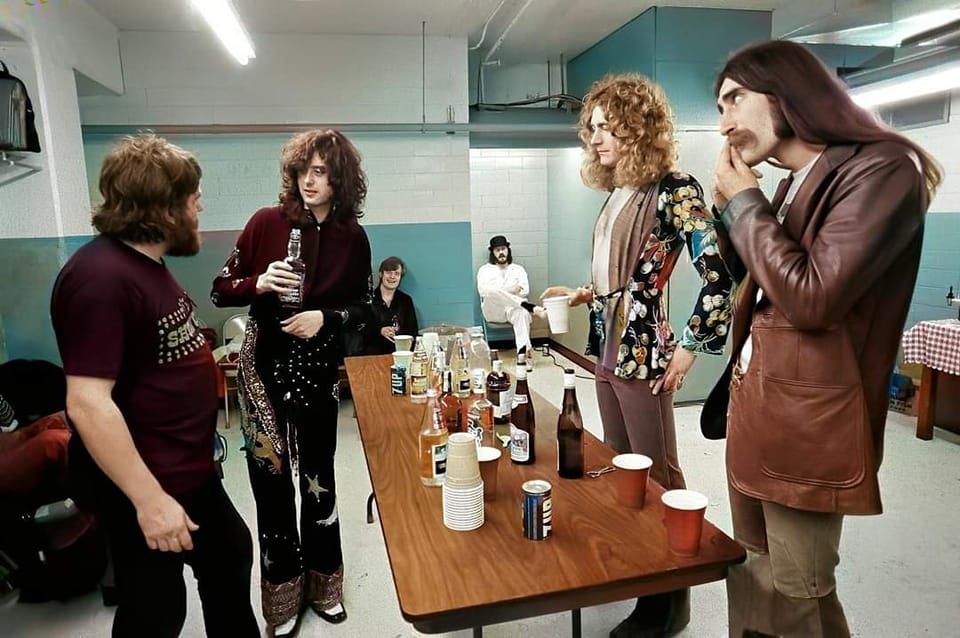
Alchemists are persons
engaged in research and experimentation
with matter; they are the chemists (and,
to a lesser extent, the biochemists)
of the magic-oriented universe. In general,
Alchemists are
experienced in compounding magical and
exotic substances used in
making potions, and are skilled at identifying
magical potions as well.
Many Alchemists have specialized areas
of interest, somewhat in the
manner that Sages specialize in their
areas of knowledge.
Any Alchemist may manufacture
potions for a Magic-User, and it is
recommended that the rules for costs and
time to make them as given
in the Dungeon Master's Guide,
p. 116-117, be used for the sake of
simplicity. The Dungeon Master should
make up a list of the special
ingredients necessary for each potion
as the need arises. It should be
remembered that the Alchemist is not going
to be responsible for obtaining
any of these materials, no matter how
much he or she is paid!
Arrangements should be made by the Magic-User
to provide the
necessary materials, no matter how much
he or she is paid!
Arrangements should be made by the Magic-User
to provide the
necessary materials.
Special Skills
As previously mentioned,
many Alchemists have special of
interest in their research. If not otherwise
engaged in any activity for a
player, the Alchemist will likely involve
himself or herself in personal
experimentation in a chosen field, Research
costs money, however,
and the Alchemist will doubtless expect
some support from his patron,
in the form of enough gold to purchase
space and supplies the Alchemist
believes necessary for his work. What
support the Magic-User
provides will, of course, affect that
Alchemist's loyalty to the patron
Magic-User.
The most common areas of alchemical research
and study are
listed below, with additional comments
on special knowledge the
Alchemists in that field will have as
a result:
Elemental Essences
-- This field is devoted to the study of the
four basic elements of the magical universe:
Earth, Air, Fire, and
Water. Alchemists in this field attempt
to discover the four fabled
essences of each of the elements (something
like trying to produce the
modern elements in atomic form). An example
of such an
essence is Phlogiston, the essense
of Fire. Researchers in this area of
knowledge are particularly knowledgeable
about the Elemental
Planes and their inhabitants, and tend
to be Neutral in alignment,
Metallurgy
-- This field involves the study of the refining of
metals, in pure or compounded forms, to
meet the needs of weapon-
makers, armorers,
builders, etc. Metallurgical Alchemists strive to discover or create the
yellow “ultimate metal,” Orichalcum, said to be
light as air, yet so strong that it cannot
be bent or scratched. These Alchemists are particularly knowledgeable about
the manufacture of
materials such as bronze, brass, high-grade
steel, and other important
substances.
Alchemist Characteristics
| Strength: | 1dS + 8 |
| Intelligence: | 1d6 + 12 |
| Wisdom: | 1d8 + 8 |
| Constitution: | 2d4 + 8 |
| Dexterity: | 2d6 + 4 |
| Charisma: | 3d4 + 2 |
| Age: | Middle-aged to venerable |
Alignment (roll percentile dice)
| 01-05 | Lawful Good |
| 06-25 | Lawful Neutral |
| 26-30 | Lawful Evil |
| 31-45 | Neutral Good |
| 46-65 | True Neutral |
| 66-80 | Neutral Evil |
| 81-85 | Chaotic Good |
| 86-95 | Chaotic Neutral |
| 96-00 | Chaotic Evil |
Hit Points: 10d4 plus constitution bonus, if applicable
Acids and Solvents
— Alchemists in this area of research can
create and identify acidic substances
with ease, even exotic sorts like
Black
Dragon acid. They search for the Alkahest, the ultimate solvent,
so powerful that it will dissolve any
material it is in contact with. A
secondary line of investigation in this
field deals with finding materials
to neutralize acids and their effects.
Transmutation
— This study seeks ways of permanently transforming one substance into
a new substance, of different chemical and
physical qualities. Students of this field
are familiar with the manufacture of many compounds and mixtures. Alchemists
in transmutational research work toward finding the Philosopher’s
Stone, rumored
to be a red powder that can transform
any base metal (e.g., lead,
copper, etc.) it is mixed with into one
thousand to one million times its
weight in gold. If the Philosopher’s Stone
is impure in quality, then it
transmutes the base metal it is mixed
with into silver.
Toxins and Antitoxins
— Much of the research that Assassins
do
when studying poisons is taken up in this
field, but on an even deeper
level. Evil-aligned Alchemists often work
in this field, though some
good-aligned ones do as well, researching
various antidotes, antivenoms, and the like. There are two main thrusts
to the research in
this field; one goal is to discover the
Aqua
Mortis, the absolute poison,
instantly fatal and completely undetectable.
The other goal is to find
the Aqua Vitae, the Elixir of Life,
which will cure all diseases or ills and
prolong life indefinitely. Some of these
Alchemists will maintain close
ties with an Assassins’ Guild if they
are doing poison research, while
those working with antitoxins may be part
of a major church or
religious organization.
Biogenesis
— This field parallels modern biochemistry in its scope,
though of course the methods are very
different. These Alchemists
use chemical and magical substances to
produce new and different
forms of life, and are the Alchemists
that must be consulted when a
Magic-User desires to create a Homonculous.
Other abilities of students of biogenesis include the creation of certain
magical monsters
such as the Cockatrice and the Basilisk,
and some Alchemists are able
to make a Flesh Golem (though these characters
are rare indeed).
Work in biogenesis is geared to ultimately
producing spontaneous
generation, the creation of organic life
from inorganic material.
It should be noted that the goal of each
field is the attainment of an
absolute — not possible in a technological
universe but not necessarily
impossible in a magical universe in which
the existence of absolutes is
a fundamental law. Any Alchemist will
only rarely (5%) achieve his or
her goal to find Phlogiston, Orichalcum,
or whatever in his or her lifetime. An Alchemist in the hire of a player
character will never achieve
those goals, since his or her research
will be constantly interrupted by
requests from the Magic-User for new potions
and other diversionary
research. Dungeon Masters should consider,
too, the possible effects
of actually developing such “absolute”
materials (in what container
could the Alkahest be kept?), and any
research that is not interrupted
by the player character will be costly
indeed. Dust from an Outer
Plane, water from the sea of another world,
an ointment used in an
bygone age: These are some of the possible
needs the Alchemist may
envision for his/her research (and most
leads may well prove false!)
Hiring an Alchemist
Alchemists may only be hired by Magic-Users
of 7th level (Enchanter) or above.
Other classes may consult Alchemists for
answers
to specific questions related to that
Alchemist’s field of expertise, but
employment for long-term projects will
not be taken. Nearly all Alchemists will be found in cities or large towns,
and are part of a formal
or semi-formal Brotherhood that provides
support for alchemical
studies. An advance of 10 to 100 gold
pieces must be offered, with a
promise of at least a full year of employment
and a well supplied
laboratory as outlined on p. 116 of the
DMG,
before an Alchemist will
seriously consider employment with the
Magic-User. The usual
monthly payment for an Alchemist runs
between 30 to 120 g.p. to
cover used materials, purchases of texts,
etc. The minimum expenditure for the Alchemist’s laboratory should be about
10,000 g.p.
Consultation
Abilities
When consulted by any character for purposes
of answering minor
questions or identifying potions, Alchemists
usually charge a fee of
100 to 150 g.p. per day. Potion identification
will take as many hours
as its experience point value divided
by 100; potions with no experience-point value will take 2 hours to identify.
Identification has a base
90% chance of being correct, with an additional
1% added for every
point of Intelligence the Alchemist has
over 10. Thus, an Alchemist
with an Intelligence of 17 can identify
potions with 97% accuracy, and
could identify a Potion
of Longevity in 5 hours (500/100 = 5). The
same percentage chances for success may
be applied to question
asked of Alchemists in their fields of
expertise, such as asking a toxinstudying Alchemist to identify a poisonous
substance, or asking an
elemental-essence Alchemist about Salamanders
on the Plane of Fire.
Dungeon Masters should make their own
rulings on how long such
questions would take to be answered; very
involved or difficult
questions may take 3-18 days to be answered,
if they can be
answered at all.
Once an Alchemist has spent more than one
day researching a
topic for a player character, he or she
will need two days of rest for
every seven spent in the laboratory, during
which time the Alchemist
will do no productive Alchemical research.
Loyalty to the player character may drop if the Magic-User disrupts this
off-duty time frequently.
Non-Human or
Part-Human Alchemists
Humans, elves,
and half-elves only may become Alchemists. These
are also the only races that may use magic;
hence the limitation. If a
Magic-User attempts to hire an Alchemist
of a different race than his
or her own, then some resistance and prejudice
may be encountered.
These problems may be overcome given time
or favorable treatment.
For the creation of homonculi, it is suggested
that Pseudo-Dragon
venom and Gargoyle blood be among, the.
required ingredients, as
well as the Magic-User’s own blood, since
these items bear some relationship to a Homonculous’s poisonous bite and
appearance. Costs
and time for making
a Homonculous are outlined in the Monster
Manual.
Alchemists may engage in hand-to-hand combat
using either a
dagger or a club (symbolic of the pestle
used in the alchemical trade),
at the same “to hit” odds as a 10th-level
Magic-User. They wear no
armor and may use oil.
Formulas for manufacturing cockatrices
may be found in L.
Sprague de Camp’s book, The Ancient
Engineers, Chapter 9, “The
European Engineers.” Additional notes
appear in The Worm
Ouroborous, by E. R. Eddison, “Conjuring
in the Iron Tower.” Note
that de Camp’s book refers to the cockatrice
as a “basilisk,” and tells of
an alchemical way of making gold from
burnt “basilisk” parts.
At the Dungeon Master’s option, cloning
may be performed by biogenesis-studying Alchemists;
this should be considered a very powerful
(and very rarely performed) ability that will entail expenditures of
100,000 g.p. or more. Making Flesh Golems
should be handled in a
similar way. The Manual
of Golems can be handled and used by Alchemists only if it discusses
creating Flesh Golems; all other golemmaking manuals cause 6-36 points
damage to the reading Alchemist.
1. SUBCLASS = Magic-user
2. SOCIAL CLASS MINIMUM =
3. ABILITY SCORE MINIMUMS
STRENGTH =
INTELLIGENCE = 15 (17*)
WISDOM = 13 (16*)
DEXTERITY = 13
CONSTITUTION = 15
CHARISMA =
COMELINESS =
PERCEPTION =
4. XP BONUS =
5. POSSIBLE RACES =
6. MAXIMUM LEVEL ATTAINABLE =
7. HIT DIE TYPE =
8. MAXIMUM NUMBER OF HIT DICE =
9. SPELL ABILITY =
10. ARMOR PERMITTED =
11. SHIELD PERMITTED =
12. WEAPONS PERMITTED =
13. OIL PERMITTED =
14. POISON PERMITTED =
15. ALIGNMENT =
16. STARTING MONEY =
17. WEAPON PROFICIENCIES =
18. NON-PROFICIENCY PENALTY =
19. NON-WEAPON PROFICIENCIES =
20. STARTING AGE =
21. COMBAT =
22. SAVING THROWS =
23. MAGIC ITEMS =
<alchemical cocaine: strong stimulant
(DMG.82)>
<lowers personal temperature by 10 degrees>
<10% chance of going snowblind (WSG), with a 1% chance of permanent
snowblindness>
<user becomes cheerful (+d6 ERM) and loquacious (+d8 ERM)>
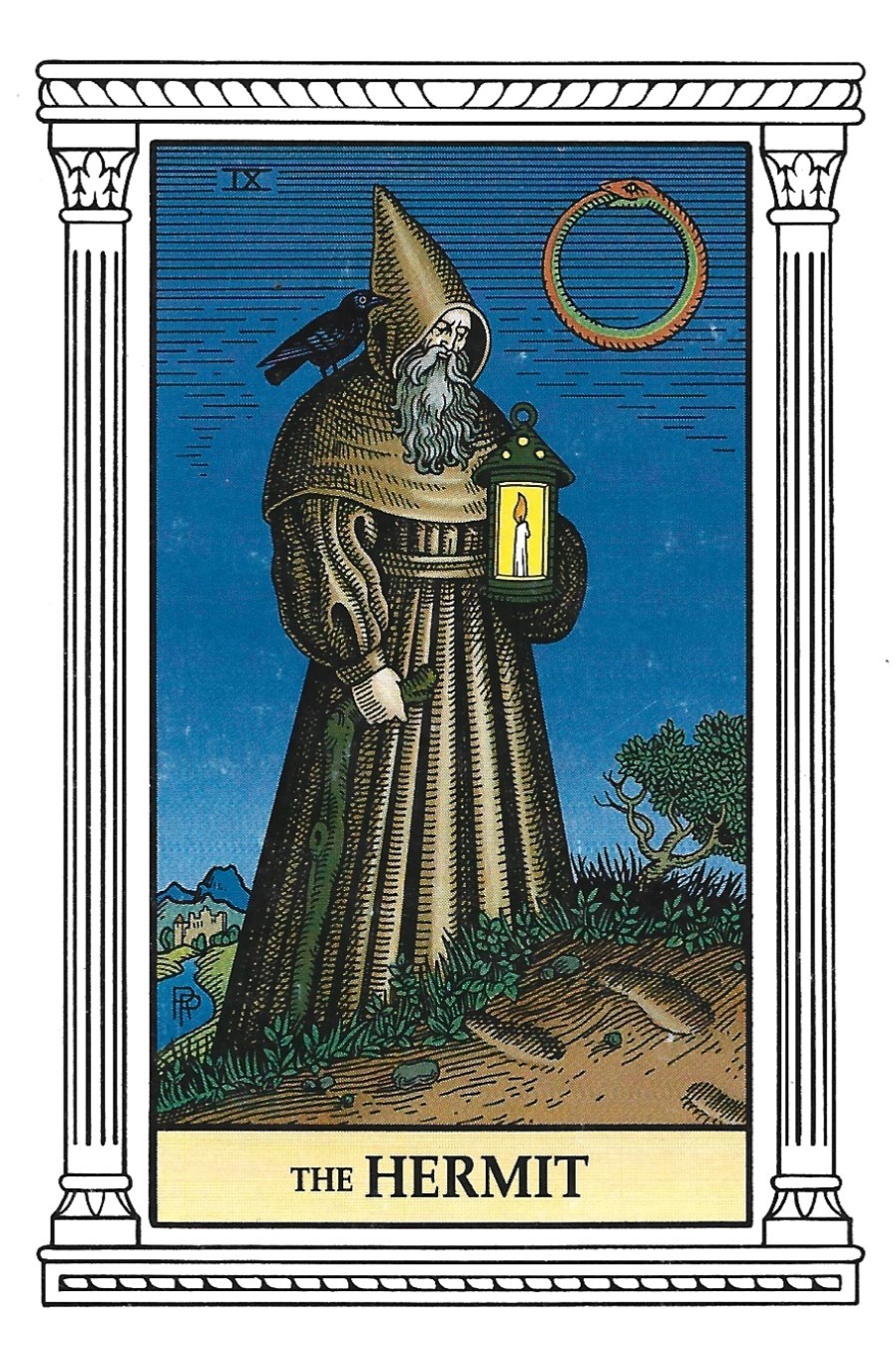
22.
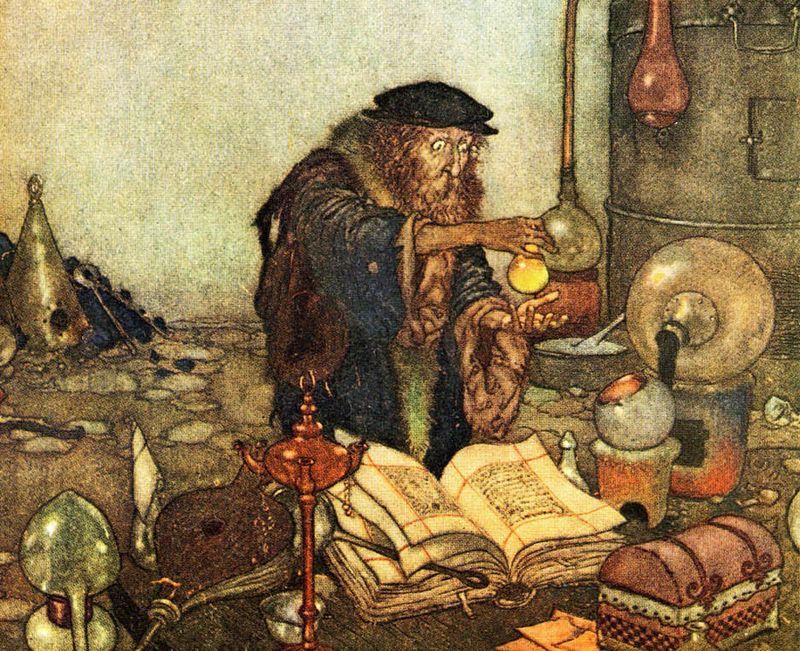
21. Korindell (alchemist 18; 91.265)
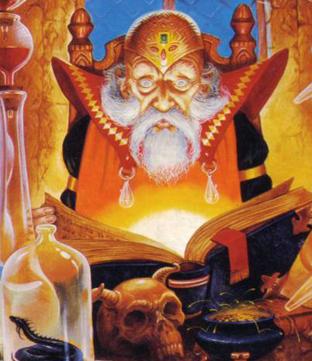
20.
Neiglub, Apothecary to Kings
19.
18.
17.

16.
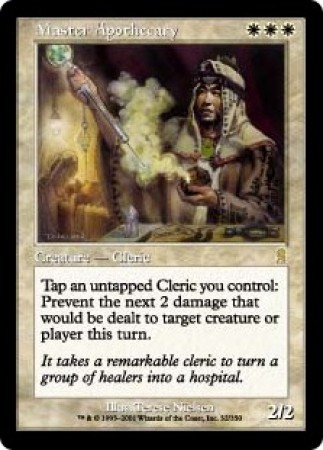
15.
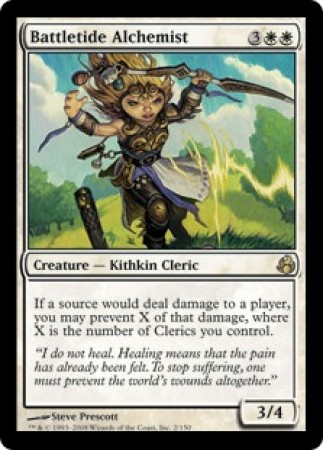
14.
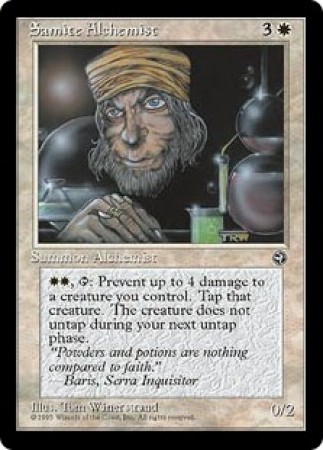
13.
12.
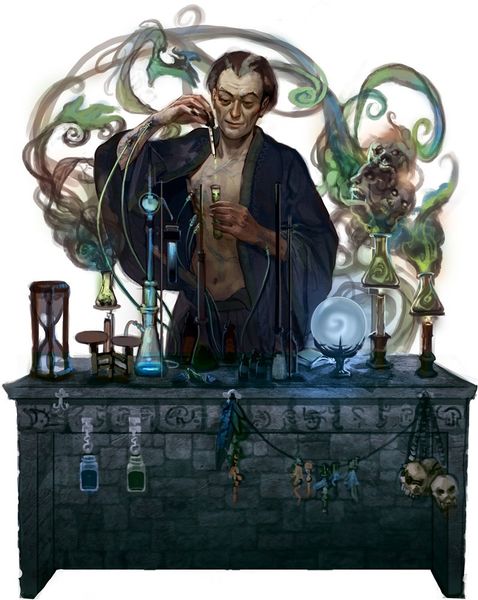
11.
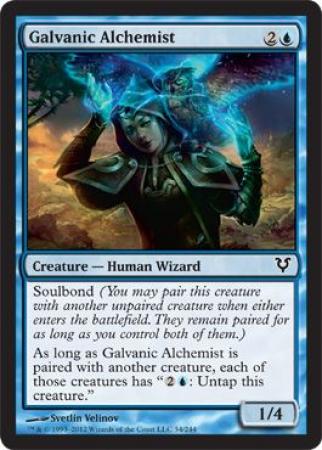
10.
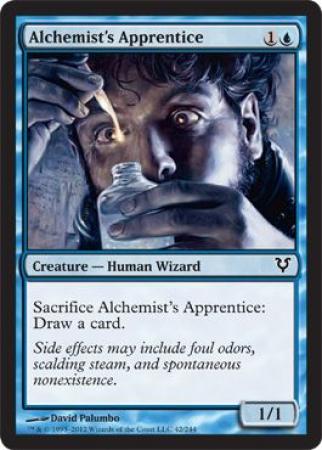
9.
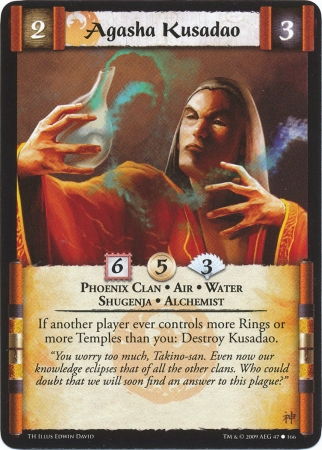
8.
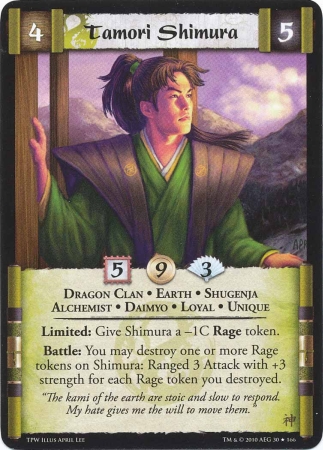
7.
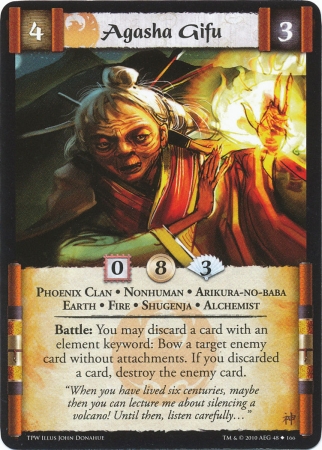
6.
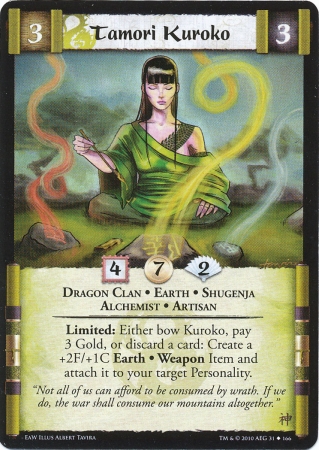
5.
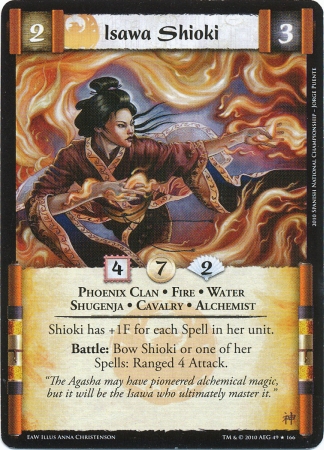
4.
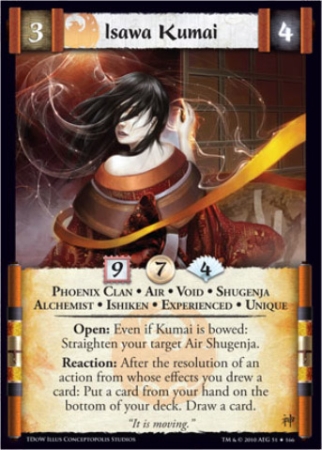
3.
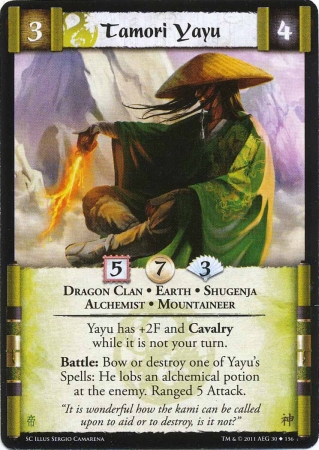
2.
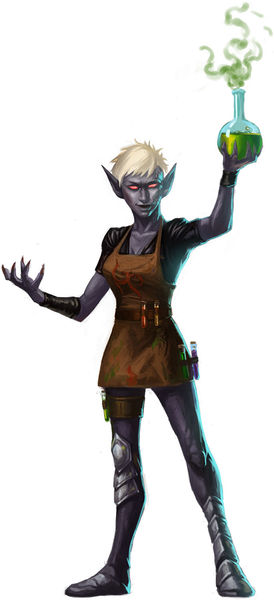
Drow Alchemist
1.
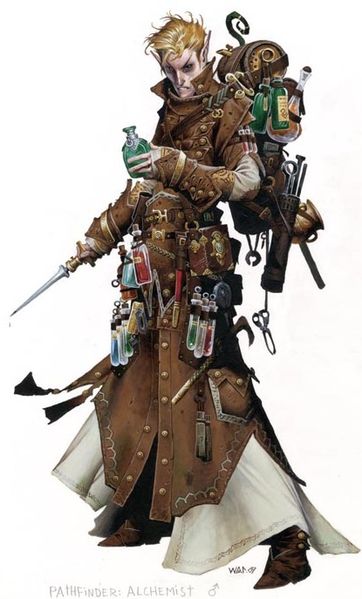
Damiel